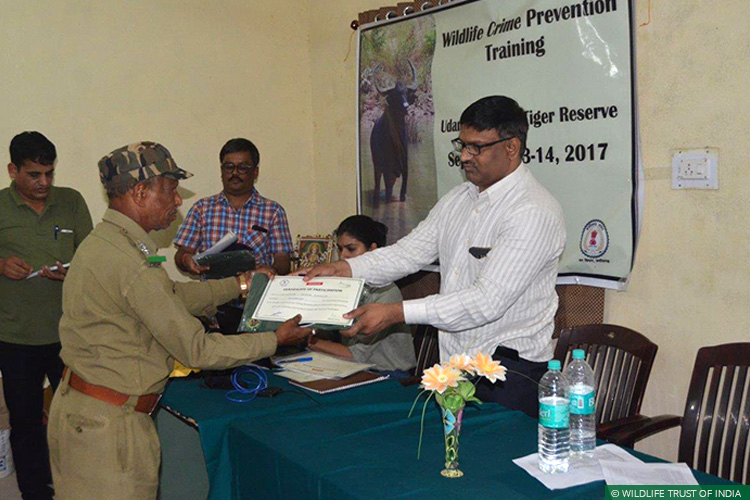
Udanti-Sitanadi Tiger Reserve, Chhattisgarh, September 26, 2017: As part of the continuing efforts under its Van Rakshak Project to train, equip and boost the morale of frontline forest staff across the country, Wildlife Trust of India (WTI), in partnership with the Chhattisgarh Forest Department and with support from Oracle, conducted a two-day refresher training programme for the staff of Udanti-Sitanadi Tiger Reserve (USTR) from September 13 to 14, 2017. The first phase of training had been conducted in for the same staff in August 2016.
The programme was inaugurated by V Reddy, Deputy Director of USTR and was attended by 50 frontline personnel from across eight ranges of the tiger reserve. The curriculum included legal and biological aspects of the Wild Life (Protection) Act, 1972, as well as wildlife crime prevention components such as the basics of wildlife biology, tracks and signs, anti-poaching patrolling techniques, intelligence gathering, search and seizure, interrogation, crime scene investigation and the preparation of Preliminary Offence Reports. Trainees were also briefed on relevant provisions of the Indian Evidence Act, Indian Penal Code and the Code of Criminal Proceedings, and the powers conferred on them therein for the prosecution of wildlife crimes.
The purpose of the training was to ensure that forest staff remains versed with the investigative and the legal aspects of wildlife crime, with close attention paid to proper case documentation and appropriate legal procedures. Trainees were evaluated on the basis of a test conducted before and after the programme; field kits were distributed to trainees who passed this evaluation.
“It is very important that frontline personnel who have undergone training earlier refresh their lessons in wildlife crime prevention and the procedural aspects of law enforcement”
“It is very important that forest department personnel who have undergone training earlier refresh their lessons in wildlife crime prevention and especially the procedural aspects of law enforcement”, said Jose Louies, Chief of WTI’s Wildlife Crime Control Division. “We hope that this continued training process will help them undertake their duties better and give them a sense pride in their role on the frontlines of wildlife protection.”
Advocate Yash Kumar Soni, a consulting lawyer with WTI, emphasised the need to teach frontline personnel how to prepare legal documents in the proper manner. “It is the single largest problem when it comes to the proper enforcement of wildlife law, not only in the state but the country at large. Frontline forest personnel have a multifaceted role to play in wildlife protection and this aspect, unfortunately, has been neglected. Our aim through these continued trainings is to address this shortcoming.”
WTI’s Dr Rajendra Prasad Mishra, Manager of the Species Recovery programme and Prerna Panwar, Project Officer with the Wildlife Crime Control Division, were also present during the training to motivate and educate frontline forest staff.
WTI has been conducting such Wildlife Crime Prevention Training programmes under its Van Rakshak Project (VRP) since 2001. Over 16,500 frontline forest personnel have been trained in over 138 Protected Areas across 14 states. VRP follows a multi-pronged strategy with four thrust areas abbreviated as TEAM: Training, Equipping, Awareness and Morale Boosting, to build capacity and strengthen the spirit of personnel in tough field conditions.